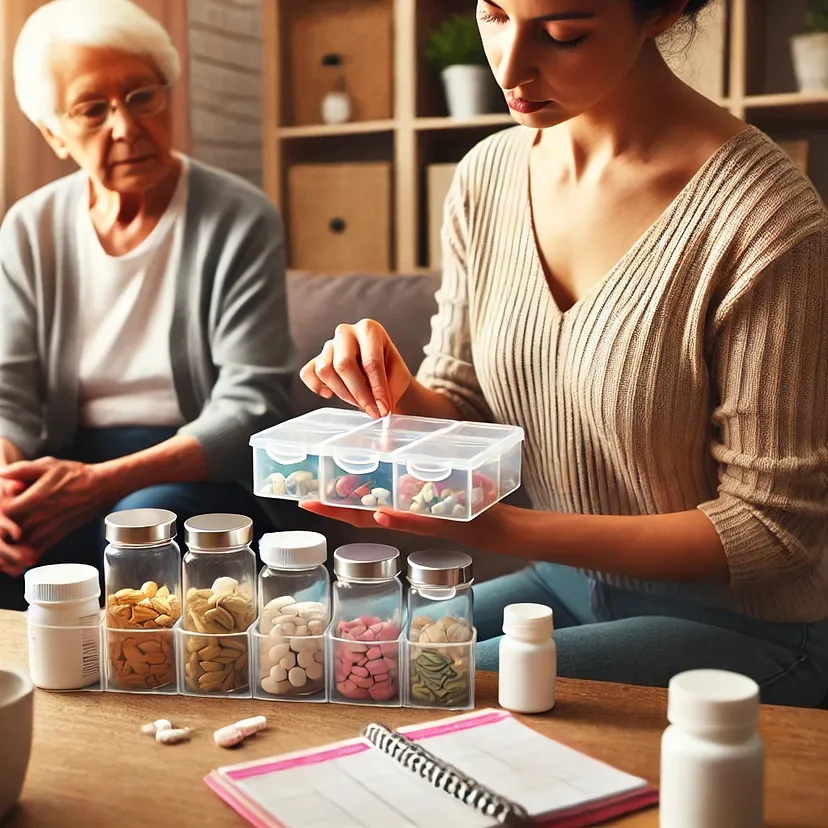“I wish I’d started monitoring my husband’s medication sooner.”
As caregivers for our loved ones with Alzheimer’s and other types of dementia, we’ve learned that medication management becomes increasingly challenging. Through our experiences, and what we’ve learned from support groups and others on their journeys, we’ve developed four important tips to help you support your care receiver with medication management.
Understanding Medication Management in Dementia Care
Beginning the moment of the diagnosis, you become the eyes and ears for your loved one. Healthcare providers rely on you to monitor daily medication effects and raise concerns about necessary adjustments. This responsibility requires continuous observation, thoughtful preparation, and gradually adaptating strategies.
Here are four tips to help you support your care receiver with medication management.
Tip 1: Begin Medication Audits
From the time our care receiver receives their formal diagnosis, medication audits become vitally important. Their medical team needs a thorough understanding of all medications, supplements, and alternative treatments to prevent dangerous interactions and ensure effective care.
Key points:
- Create complete listings of all prescribed medications
- Include all supplements and alternative medicines
- Use one pharmacy whenever possible
- Share medication lists proactively with all doctors
- Make sure medical teams can share information
Sue’s Experience:
Even before my husband was diagnosed, we had talked about the medications he was taking and the supplements he was taking. That was fine; we had the information. When he was diagnosed, we did the full audit. When we reviewed it with our doctor, he began asking questions about the different medications and the different supplements. When he came to two different supplements, he asked my husband, Jack, why he was taking them. Jack said, well, one of my buddies was taking them, and they sounded like they were good, so I just started taking them. The doctor explained they interacted with a medication Jack was currently taking — we had no idea! This was a huge red flag for me. I vowed from that point on, I would make sure every doctor knew any medication, supplement, or anything else, so we were able to be proactive in making sure none of them interfered with each other.
Tip 2: Be Their Advocate
Being their advocate involves both legal and practical aspects of medication management. This ensures you can effectively participate in their medical care and decision-making.
Key points:
- Obtain Medical Power of Attorney specific to your state
- Secure HIPAA rights at each medical provider
- Consider Advanced Healthcare Directives
- Financial and medical powers of attorney are separate documents
- Make decisions through the lens of “what would I want?”
Nancy’s Experience:
I learned a lesson the hard way when I took the financial power of attorney document to a doctor’s appointment with my father-in-law and they said “You don’t have his medical power of attorney. You don’t have the right to sit here and have this conversation and make this decision for him.” Thank goodness I got the medical power of attorney document. I learned it is important to have both documents.
Nancy’s Experience:
We talked about being your legal receiver’s legal medical advocate. You’re also their on the ground, day-to-day, medical advocate with their doctor. The doctor is counting on you to observe what’s happening every day, make recommendations or have discussions with them around any potential medication adjustments that need to happen.
Here are a couple of examples that are very common with people living with dementia. They have sleep challenges and/or behavior challenges. There are many medication options that can help with these and it’s not always easy to decide what to do.
The lens I look through when I think about how to make medication choices for my care receivers, is if the roles were reversed, what would I want them to decide?
This is a really powerful guidepost for me. What and how would I want them to do if they were making this decision for me? This gives me a lot of peace of mind when making difficult decisions around medication.
Tip 3: Take Over Medication Distribution
Begin monitoring medication distribution as soon as your care receiver has a diagnosis. Don’t wait for problems to arise.
Key points:
- Monitor when medications are running low
- Check how medications are organized
- Watch the actual taking of medication
Consider solutions like:
- Pill dispensers with alarms
- Phone alerts for caregivers
- Pharmacy-prepared pill packs
Nancy’s Experience:
A few months after my husband’s diagnosis, he started acting more confused – a lot more confused than normal -or than he had been. I thought “What has happened — he has really taken a turn for the worst.” I called the neurologist and got an appointment. I went to his office to tell him and he’s got his pill box in front of him. He says “You see this medication right here?” I said “Yes.”. He said “I’ve been out of this one for a couple of weeks so I haven’t been taking it.” It was his dementia medication! No wonder he’s confused? I thank goodness it was a medication that showed symptoms. What if it was his heart medication or something that was critical to his survival? I just said “Would you like me to put your medication in the pill box for you?” He said “That’d be awesome.” He was struggling. He was happy to have me take it over. I wish I’d taken over sooner!
Tip 4: Adapt Medication Delivery Methods
As our loved one’s journey progresses, we may need to change how they take their medication. Many care receivers forget how to swallow pills or resist taking them.
Key points:
- Consider pill crushers
- Test different food options for mixing medication — Always verify food preferences before adding medication
- Pills that dissolve in liquid
Try alternative medication forms:
- Liquid versions
- Powders
- Creams or patches
- Nasal or oral sprays
- Chewable gummies
- Suppositories
- Injections
Sue’s Experience:
My dad was struggling to swallow pills, so we got a pill crusher. It worked great. Through his entire journey, he loved applesauce, so it was not an issue to put his medication in. On the other hand, my husband loved anything chocolate – anything. I put his medication in chocolate pudding. One day he quit wanting chocolate pudding — even without medication.
Nancy’s Experience:
We give my husband his medication, which we call dessert. We don’t call it medication. We give it to him after dinner and in a little small yogurt, mixing his medication in it. After about two bites, he was done having his yogurt. I’d be freaked out because the whole medication was in the yogurt and he wasn’t about to eat anything else. We’ve learned to crush the pills on top of the yogurt so he gets the medication in the first couple bites.
Special Considerations for Independent Living
When your loved one lives independently, medication management requires extra vigilance and creative solutions.
Key points:
- Monitor medication supplies closely
- Consider camera placement to observe them taking medications
- Watch for unusual patterns or behaviors
- Be prepared to adjust strategies as needed
Sue’s Experience:
One of the young ladies in a support meeting said that she went over to help her mom clean up. She was getting ready to throw some things in the trash and she saw something shiny. When she looked down there were all these pills in the trash. She said “Mom, Why did you throw out your pills? She said “I didn’t, I was just cleaning up the kitchen. I was getting all these crumbs off the counter.” Part of the diagnosis is changes in depth perception and vision. Her mom had apparently gotten the medication out, put it all on the counter, and then got distracted with something else. When she came back to them she couldn’t see them clearly, thought they were crumbs, and threw them out.
Final Thoughts
Medication management is a continuous journey that evolves with your care receiver’s needs. While it may seem overwhelming at first, remember that small steps toward better organization and monitoring can make a significant difference in your loved one’s care and safety.
Key takeaways:
- Start medication monitoring early
- Secure legal advocacy rights
- Adapt delivery methods as needed
- Monitor consistently
- Stay in communication with healthcare providers
- Give yourself and your care receiver grace as you navigate changes
If you have tips you think others would benefit from, please share them on our Facebook page or Instagram page.
We’re all on this journey together.






Join the community